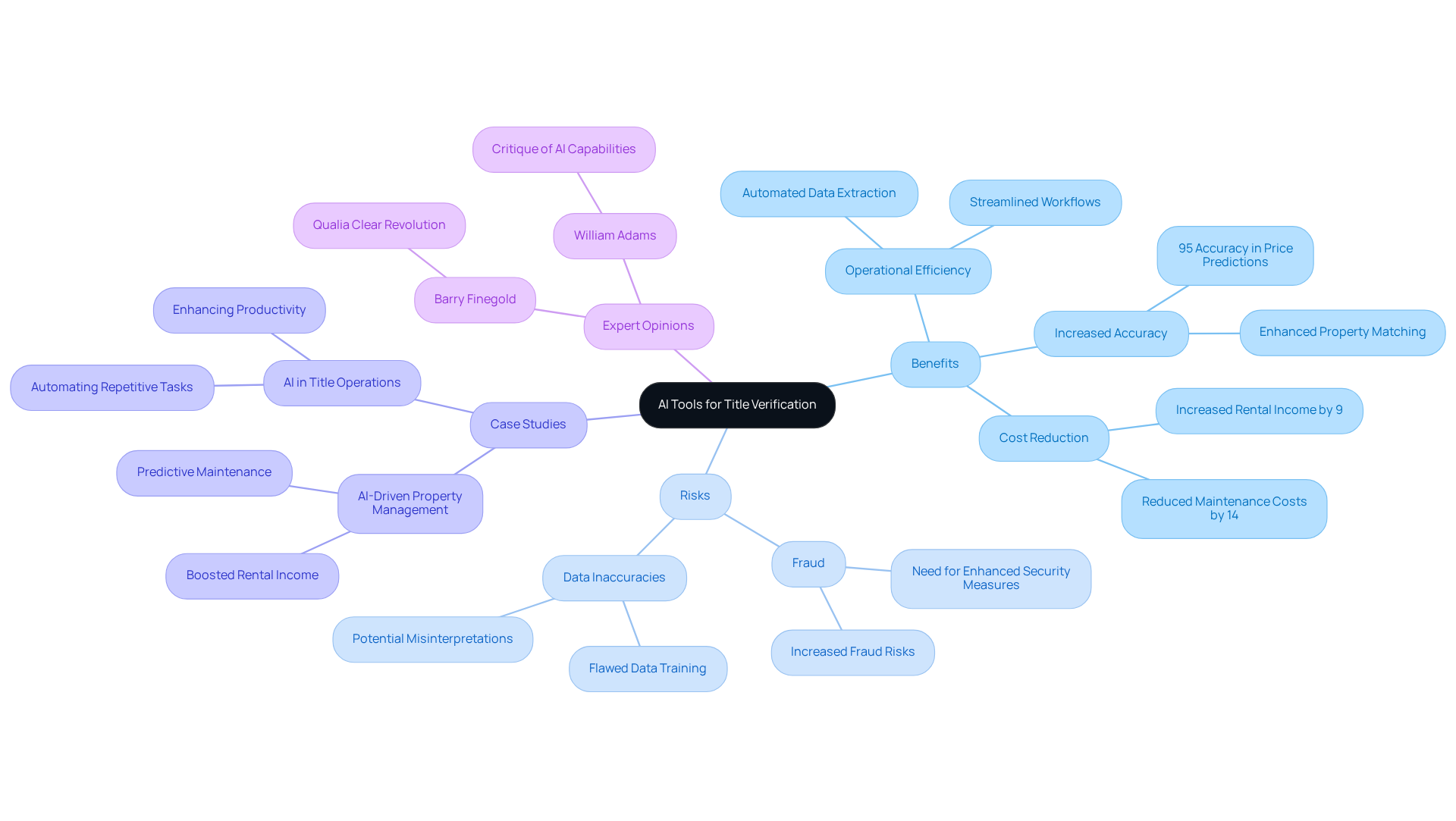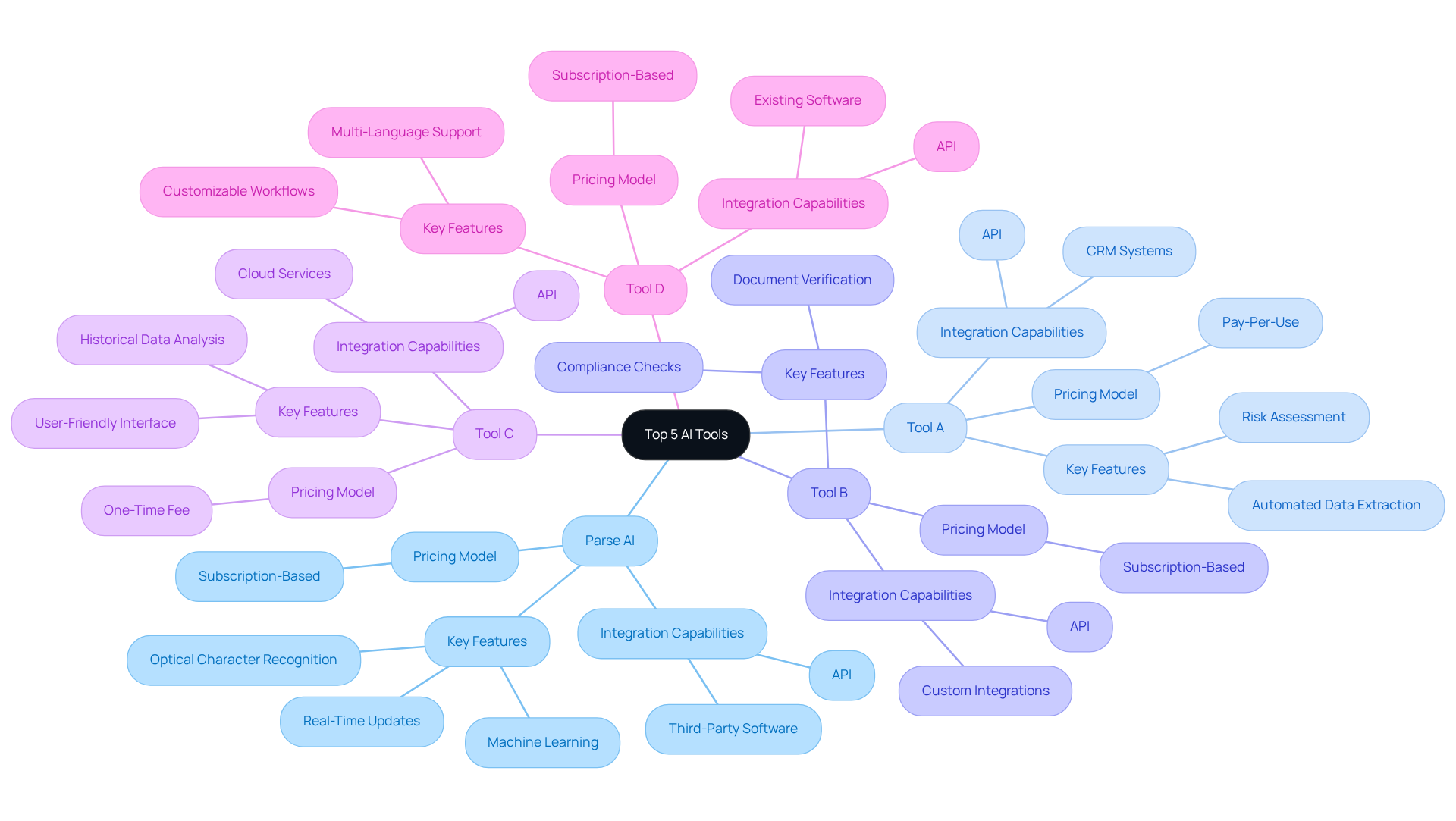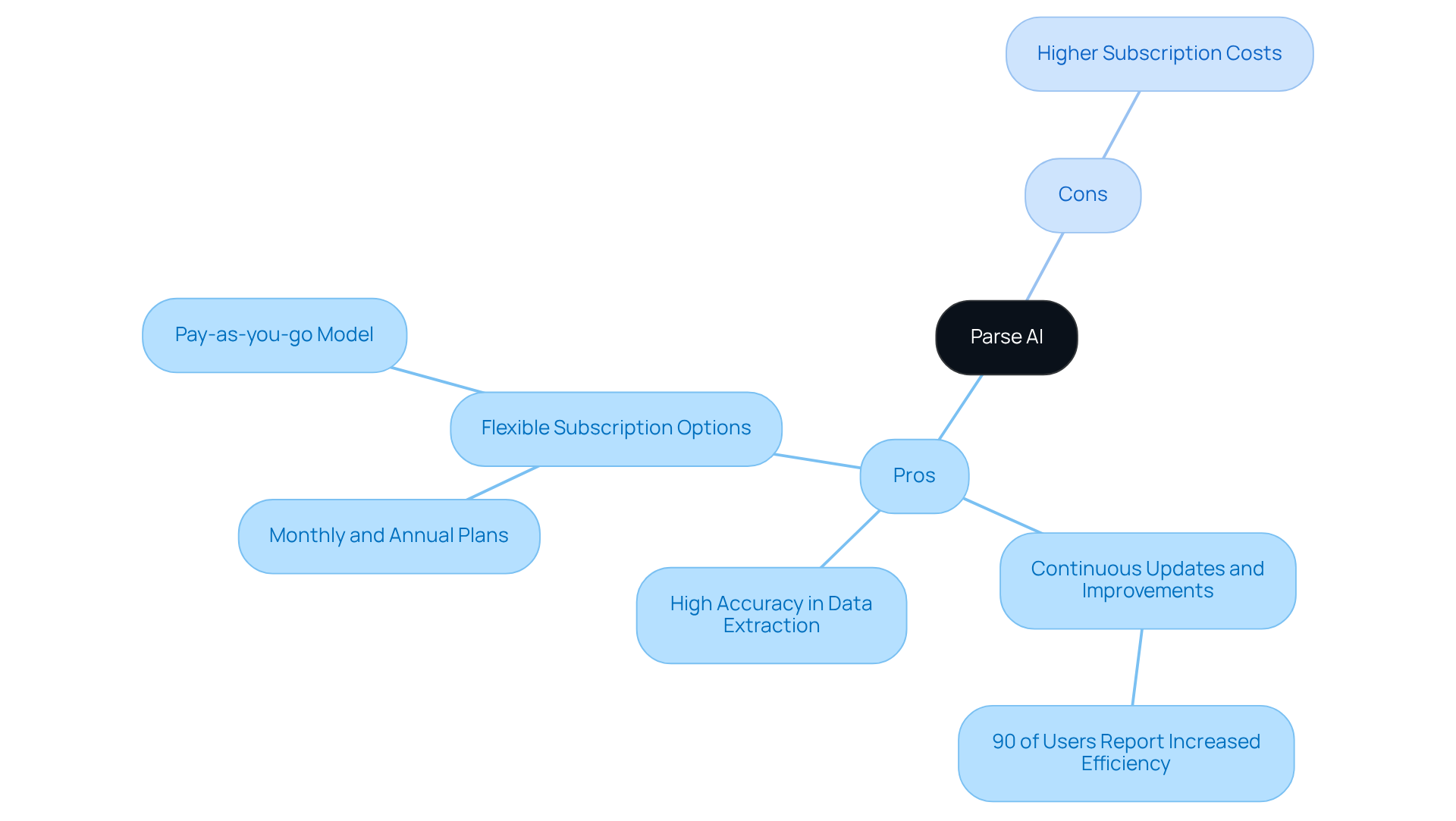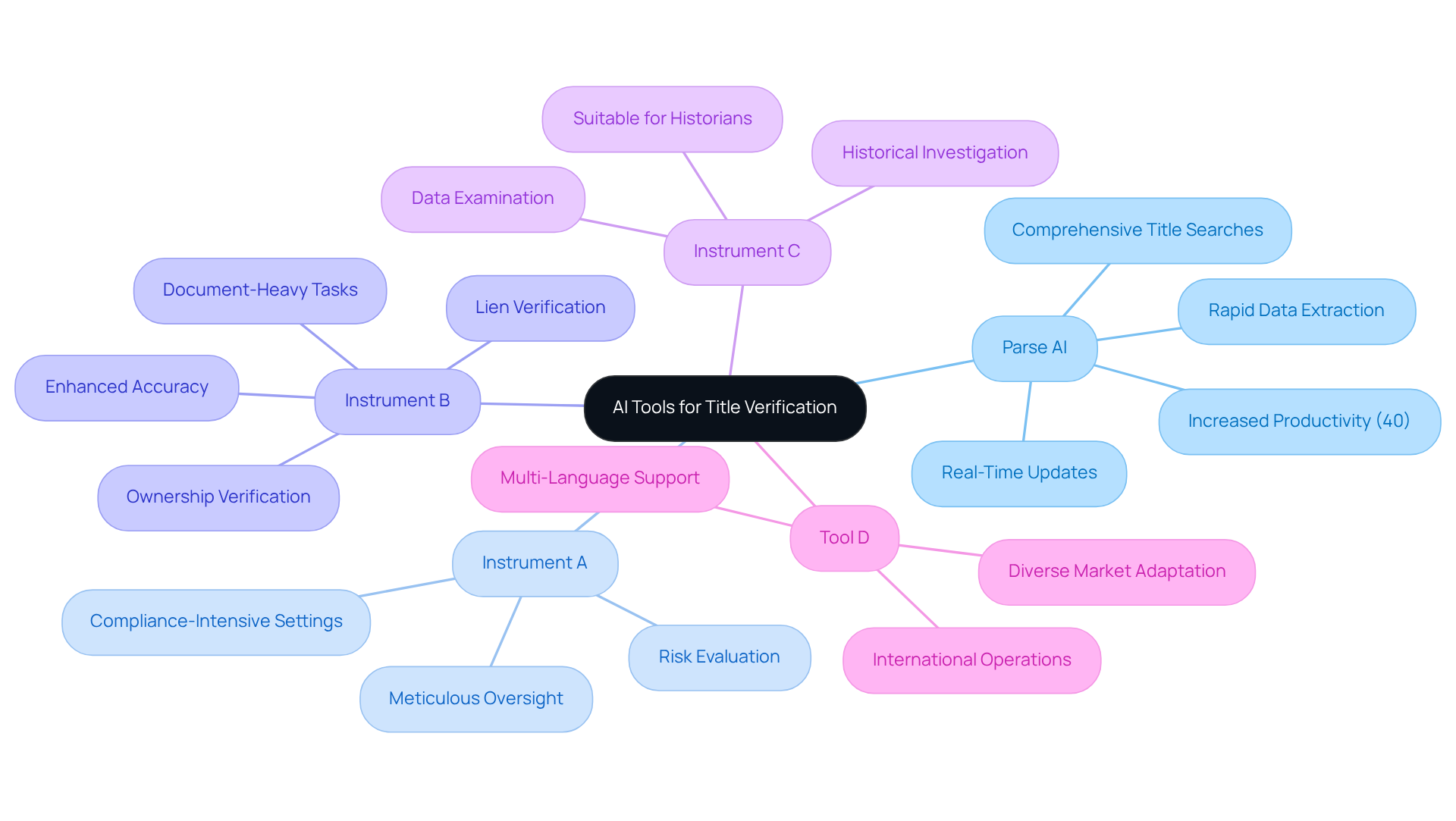Overview
The article provides a comprehensive comparison of five AI tools designed for title verification tasks, underscoring their distinct features, integration capabilities, and suitability for various operational needs within the real estate sector. It highlights the critical importance of accurate title research in enhancing operational efficiency. Furthermore, it addresses the challenges faced by professionals in this domain.
By leveraging these AI tools, professionals can significantly enhance efficiency, accuracy, and productivity. Case studies illustrate this, showcasing improvements in rental income and reduced reconciliation times, thereby reinforcing the conviction that these solutions are essential for success in the industry.
Introduction
The real estate sector is experiencing a profound transformation, propelled by the integration of artificial intelligence in title verification tasks. This technological advancement streamlines workflows, enhances accuracy, and reduces costs, thereby presenting a compelling opportunity for industry professionals. However, with a plethora of AI tools available, how can one discern which solution best fits their specific needs while navigating the potential risks associated with these innovations?
Furthermore, the significance of accurate title research cannot be overstated. It is essential for ensuring legal clarity and preventing disputes. Yet, professionals face challenges in keeping pace with evolving technologies and managing the intricacies of various AI solutions. Consequently, understanding these challenges is crucial to harnessing the benefits of AI effectively.
Overview of AI Tools for Title Verification
The use of AI for title verification tasks is revolutionizing the real estate sector by addressing the limitations of traditional methods. By employing machine learning and optical character recognition (OCR), these resources automate the extraction and analysis of data from document titles, significantly enhancing operational efficiency.
Industry leaders assert that the integration of these technologies not only streamlines workflows but also boosts accuracy and reduces the time and costs associated with title research. For instance, platforms utilizing machine learning can predict property price trends with up to 95% accuracy, empowering investors to make informed decisions (source: All About AI).
Furthermore, case studies demonstrate that AI-driven property management platforms can increase rental income by as much as 9% while reducing maintenance costs by 14% (source: AI-Driven Property Management Platforms case study). As the demand for efficiency escalates, understanding the capabilities of various AI resources, particularly AI for title verification tasks, is essential for real estate professionals aiming to enhance their operations and maintain competitiveness in a shifting market landscape.
Additionally, as Barry Finegold, CEO of Dalton & Finegold, notes, "Qualia Clear is not just an evolution; it’s a revolution for our operations," underscoring the transformative potential of AI within the industry. However, it is equally important to acknowledge the potential risks associated with AI, such as heightened fraud and data inaccuracies, as highlighted by industry experts like William Adams. This balanced perspective is vital for professionals navigating the complexities of AI integration.

Feature Comparison of the Top 5 AI Tools
-
Tool Name: Parse AI
- Key Features: Machine learning, optical character recognition, real-time updates
- Integration Capabilities: API, third-party software
- Pricing Model: Subscription-based
-
Tool Name: Tool A
- Key Features: Automated data extraction, risk assessment
- Integration Capabilities: API, CRM systems
- Pricing Model: Pay-per-use
-
Tool Name: Tool B
- Key Features: Document verification, compliance checks
- Integration Capabilities: API, custom integrations
- Pricing Model: Subscription-based
-
Tool Name: Tool C
- Key Features: Historical data analysis, user-friendly interface
- Integration Capabilities: API, cloud services
- Pricing Model: One-time fee
-
Tool Name: Tool D
- Key Features: Multi-language support, customizable workflows
- Integration Capabilities: API, existing software
- Pricing Model: Subscription-based
This comparison highlights the varied functionalities of these tools, enabling users to select the solution that aligns best with their operational needs. Furthermore, RynohLive has demonstrated a remarkable ability to reduce reconciliation time from hours to mere minutes, showcasing its efficiency. Users have expressed high satisfaction with Rynoh's services, noting significant time savings in their daily operations. For instance, Deb Sunderland from Percy Law Group emphasized how Rynoh has greatly minimized the time spent on manual reconciliations, providing peace of mind. Incorporating these insights adds depth to the comparison and underscores the practical benefits of each tool.

Pros and Cons of Each Tool
Parse AI
Pros:
- High accuracy in data extraction is achieved through advanced machine learning algorithms, ensuring reliable results for title verification.
- Continuous updates and improvements, driven by user feedback, enhance overall performance and user satisfaction. A recent survey revealed that 90% of users experienced increased efficiency in their role assessment tasks after adopting Parse AI.
- Flexible subscription options are available, including monthly and annual plans, as well as a pay-as-you-go model, allowing users to select what best fits their needs. Our customer success team stands ready to discuss tailored solutions based on your subscription requirements, as detailed in our FAQs.
Cons:
- Subscription costs may exceed those of some competitors, which could be a consideration for budget-conscious users.

Suitability for Various Title Verification Tasks
Different AI tools excel in various aspects of title verification, making it essential to match the right tool with the appropriate task:
-
Parse AI is ideal for comprehensive title searches that require rapid data extraction and real-time updates, making it suitable for busy title agencies. Studies indicate that professionals using AI tools can complete tasks up to 40% faster than traditional methods, aligning with findings that AI can potentially increase productivity by up to 40% (PwC).
-
Instrument A is optimal for compliance-intensive settings where risk evaluation is essential, such as in legal practices or financial organizations. Its robust features ensure meticulous oversight, which is essential in these settings.
-
Instrument B is well-suited for document-heavy tasks, such as verifying ownership and liens, due to its strong verification capabilities that enhance accuracy and dependability in research.
-
Instrument C is ideal for historical investigation, where examining past data is essential, making it suitable for real estate historians or scholars.
-
Tool D is advantageous for international operations due to its multi-language support, catering to businesses that operate in diverse markets.
By recognizing the specific strengths of each resource, real estate professionals can choose the most effective solution for their title verification tasks. As noted by industry experts, leveraging the right AI tools can significantly enhance productivity and accuracy in workflows.

Conclusion
The integration of AI tools for title verification tasks marks a pivotal advancement in the real estate industry, delivering enhanced efficiency and accuracy when compared to traditional methods. By leveraging machine learning and optical character recognition, these tools not only streamline workflows but also empower professionals to make informed decisions, ultimately transforming the landscape of title verification.
Throughout this article, we explored key insights into five leading AI tools, highlighting their unique features, integration capabilities, and pricing models. Tools like Parse AI distinguish themselves with high accuracy and real-time updates, while others, such as Tool A and Tool B, cater to specific needs like compliance and document verification. This comparative analysis underscores the necessity of selecting the right tool based on operational requirements to maximize productivity and minimize risks.
As the demand for efficient title verification continues to escalate, embracing AI technology has become essential for real estate professionals striving to remain competitive. By comprehending the strengths and weaknesses of various AI solutions, businesses can optimize their operations and enhance their service offerings. The future of title verification is undoubtedly intertwined with AI, and taking proactive steps to adopt these tools will pave the way for innovation and growth within the industry.
Frequently Asked Questions
What is the role of AI in title verification?
AI is revolutionizing title verification in the real estate sector by automating the extraction and analysis of data from document titles using machine learning and optical character recognition (OCR), which enhances operational efficiency.
How does AI improve accuracy and reduce costs in title research?
The integration of AI technologies streamlines workflows, boosts accuracy, and reduces the time and costs associated with title research, allowing for more efficient operations.
What is the accuracy rate of property price trend predictions using AI?
Platforms utilizing machine learning can predict property price trends with up to 95% accuracy, enabling investors to make informed decisions.
How can AI-driven property management platforms impact rental income and maintenance costs?
AI-driven property management platforms can increase rental income by as much as 9% and reduce maintenance costs by 14%, according to case studies.
Why is it important for real estate professionals to understand AI capabilities?
Understanding the capabilities of various AI resources is essential for real estate professionals to enhance their operations and maintain competitiveness in a rapidly changing market landscape.
What does Barry Finegold say about the impact of AI on operations?
Barry Finegold, CEO of Dalton & Finegold, states that 'Qualia Clear is not just an evolution; it’s a revolution for our operations,' highlighting the transformative potential of AI in the industry.
What are some potential risks associated with AI in title verification?
Potential risks include heightened fraud and data inaccuracies, which industry experts like William Adams have highlighted as important considerations for professionals navigating AI integration.




